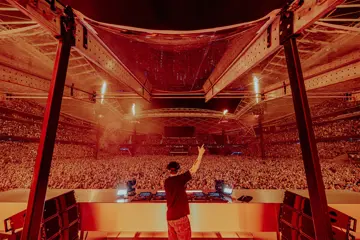BAD NEIGHBOURS
“Just because we have a house and a baby doesn't mean we're old people,” Seth Rogen says, he and wife Rose Byrne (Australian accent actually intact!) desperately trying to convince themselves that they're not losing their edge, and're still down to Party Down. These insecurities are running wild when Zac Efron, Dave Franco, Christopher Mintz-Plasse and the kid from Submarine move their wild-partying frathouse in next door, bro-ing out 'til the break o' dawn.
One of those warring-neighbours-trying-to-one-up-each-other comedies ensues, with Bad Neighbours delivering more wild-party-ruckus montages than the entire collected canon of '80s teen-movies. But director Nicholas Stoller (Forgetting Sarah Marshall, Get Him To The Greek, The Five-Year Engagement) and first-time writers Andrew J. Cohen and Brendan O'Brien manage to find the subconscious subtext of the skirmish: each side motivated by age-related anxieties; either worrying that they're now old or terrified that they soon will be.
Where a lesser comedy may've made Efron a simple villain — the ruthless party-bro shattering the wholesome existence of a pair of relatable new-parents — Bad Neighbours grants empathy to its fratboys: Efron, a beefcake sucking the marrow out of his College Years' dying glory days; Franco, an ambitious careerist for whom fraternal larks are big-picture small change. And rather than being sweet peeps driven mad by sleepless nights, Rogen and Byrne are revealed to be desperate and needy; soon addicted to the rush of neighbourhood warfare, horrified by the notion that they have to 'change and grow up' in the face of nascent parental responsibility.
Don't miss a beat with our FREE daily newsletter
Amidst this pleasingly surprising thoughtfulness, there's plenty of pantomimed debauchery, gross-out comedy, and wild comic conceits; best being a scene in which Rogen must 'milk' Byrne, moments of phrase-that-strikes-a-chord inspiration coming from the words “dicks in our hands” and “bros before ho's”, and a memorable final stoush in which a long-awaited Rogen/Efron fistfight finds them wounding themselves more than each other. There are very real limits to this bro-down's worth as a motion picture, but Bad Neighbours qualifies as a good time-killer.
CHEF

Cinema tends to be a nostalgic medium; the long gestation period of even the most swiftly-greenlit production leading to a Hollywood output almost always set in the distant-past or not-too-distant future, rarely daring to wholly inhabit the cultural now. Jon Favreau's witer/director/star-turn, Chef, however, is unafraid of being painfully of the zeitgeist.

It's a father-son-bonding movie about a down-on-his-luck chef opening a fucking food-truck, that features viral videos, online flame-wars, and tweets as animated flurries of crowd-mobilisation and/or movie-magic. As abstract — and, indeed, cinematic — idea, the dramatic engine of Chef is horrifying: we're actually really watching characters talk aloud about Twitter followers, in-screen graphics devoted to re-tweets and Vines, and a tender emotional climax in which someone uploads a home-made movie-montage to YouTube. (And if you've reached some personal food-truck saturation point, the central premise may cause your sarcastic-eyeroll to convulse wildly.)
But, in such, Chef feels like an accurate depiction of how humans actually live their lives circa 2014; where any small-business is venture 50% actual elbow grease, 50% social-media performance art. There are horrifically cheesy elements to this tale of a haute-cuisine chef rediscovering his soul through making take-away food —chiefly the 'exotic' Cuban motif, as embodied by greasy sandwiches, brassy soundtrack cues, and Sofía Vergara— but Favreau manages to nail the two most important elements of his of-the-moment movie: the father-son relationship between he and 10-year-old Emjay Anthony, and the required food-porny, cooking-channel close-ups.
SEDUCED & ABANDONED
The premise driving James Toback's documentary borders on a McGuffin: the directorial provocateur and prospective leading-man Alec Baldwin packing off to the 2012 Cannes Film Festival to try and drum up funding for a remake of Last Tango In Paris set in modern-day Iraq.
What this 'in' affords them is an opportunity to make a movie about the making of movies. Not the familiar behind-the-scenes stuff of life on set — which we've already endlessly seen on screens — but the unglamorous fundraising that comes long before a frame is ever shot; with begging-billionaires-for-cash a symbolic commentary on an artform eternally indivisible from commerce. The $12-$15mil Toback wants to raise seems like a deliberately over-reaching figure; the filmmaker seeming less as if he's out to actually make the movie, more that he wants to show how no producer would dare write such a cheque circa 2014.
And, when Toback and Baldwin are sitting down in nostalgic, career-recounting conversations with the standby macho auteurs —Scorsese, Bertolucci, Coppola, Polanski— or talking the acting craft with James Caan, Ryan Gosling, Jessica Chastain, Diane Kruger, or Bérénice Bejo, it seems less like a making-of movie, more like an Actors Studio-ish talking-heads discussion-piece about The Movies.
THE DOUBLE
Richard Ayoade's second picture is a radical departure from the feelgood coming-of-age-isms the droll-comedian-turned-director extracted from Joe Dunthorne's bildungsroman-in-'80s-Wales, Submarine. With The Double, he's drawing from an entirely different novelist, Fyodor Dostoyevsky, and he takes the source to a radical, unexpected place.

Liberally adapting the 19th-century tale of rival doppelgängers, Ayoade stages a retrofuturist dystopia of eternal darkness; mounting an impressive style-piece in which the monolithic buildings and savage shadows summon 1970s technophobia by way of 1930s silent expressionism. This alternate-reality is a sad, satirical take on the alienation of the modern metropolis, in which humans live alone in interchangeable warehouse apartments, and silently ship to-and-fro the office, never making eye contact.

Its central workplace is a gleeful portrait of bureaucracy-gone-made; a conceit conveyed in glorious comic turns by Wallace Shawn, Sally Hawkins, and genius satirist Chris Morris. Jesse Eisenberg is the twitchy, fidgety, nervous everyman lost in this nightmare, who's horrified when a bright, outgoing, smoothtalking lookalike blows into his workplace and starts making eyes at dreamgirl Mia Wasikowska. Wasikowska's character — and her performance — constantly undermines and rebels against limiting love-interest clichés, but, even then, the central romance doesn't quite take. But come for Ayoade's atmospheric mise-en-scène, which, bordering on Eraserhead-esque, ably transports viewers into its protagonist's growing state of paranoid mania.















